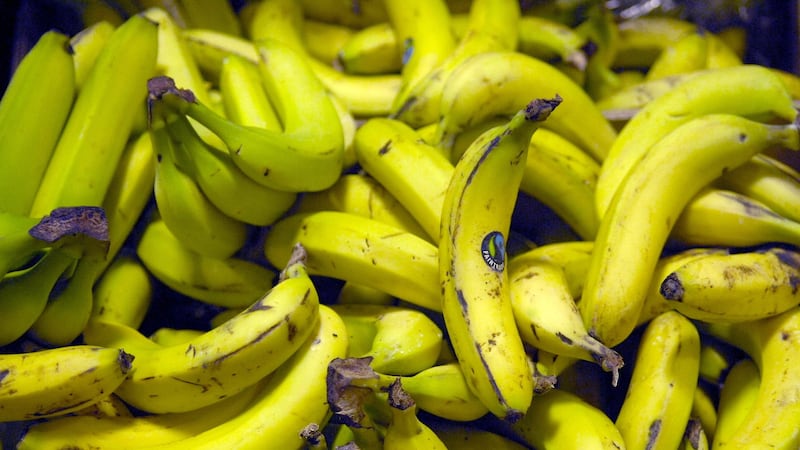Ian Theasby and Henry Firth of BOSH! don’t believe raising children on a plant-based diet should be controversial – and in fact, vegan kids could be at an advantage when it comes to health.
Firth’s 18-month-old daughter, Berry, is “a plant-based baby” so far. “Obviously, she’ll get to the point where it’s her choice and we’ll see how the land lies.”
While Theasby’s six-month-old son Zach – who is “fully in the weaning stage” – has some dairy and egg in his diet (his mum is vegetarian).
The chefs both went vegan in the 2010s, before they launched BOSH! TV online in 2016.

Firth says there’s “a lot of people who would be worried” about feeding their children a vegan diet from six months but, for them, “It’s actually been a really, really healthy choice”.
He says: “We have taken her nutrition seriously, we’ve learned what she needs. And I would also ask how many meat-eating parents have spent time and energy learning what macronutrients their child needs at each stage of development? Maybe not so many.”
From the necessary levels of calcium, iron, vitamin B12, protein and healthy fats, he ensures, along with a supplement, his toddler is receiving all the important nutrients.
“We have to be a bit more creative in the kitchen but I’d say at this point, she’s probably at an advantage rather than at a disadvantage. She’s healthy.
“You’ve just got to do a bit of learning and do it right. But what more important thing is there to learn about than, like, the nutrition of what we put in our body?”
“You’re relearning a new way of cooking… but it’s not that difficult once you get into the habit of it.”
But even if parents want to include meat and diary in their child’s diet, it’s still vital to include a lot of plants.
“From a nutritional perspective, plants are packed with phytonutrients. We want to be eating lots of different colours of fruits and veg that’s going to that’s going to give us lots of important nutrients; vitamin A, vitamin C, vitamin K, iron, potassium, antioxidants that are really crucial for helping your health. So all of these things are super-important for kids.
“Plant-based food is super-high in fibre and the most important use of fibre is in our gut. And for children, their microbiome is growing and developing, so it’s all the more important that they have a good amount of fibre coming in.
“Then you’ve got healthy habits starting early. And if you’re leaning on healthy vegetables packed with fibre, lower in calories, higher in vitamins, and you’re steering away from sugary snacks, and processed carbohydrates with high amounts of fats, you’re going to have a healthier child growing up less at risk of obesity, less at risk of early illnesses, and just you will develop into a more conscientious eater and a healthier human.”
So what’s their advice for parents – from weaning to the fussy toddler stage, and beyond?
Pack in the plants from six months
“Start early,” says Theasby. “I think the longer you leave it, the more difficult it becomes. So for brand-new parents, the best thing that I would suggest is to to get to give them lots and lots of plant-based food and a big variety of flavours right from the get-go.
“Give them a variety of different colours to play with. It’s all about hiding them as well, mixing it in their favourite foods, in smoothies and sauces, so even if they’re not choosing it, they’re still getting the benefits.”

Prioritise savoury food
Firth says: “I’d suggest trying to avoid things like bananas and the generally sweeter flavours. If you are going to offer them, do it after they’ve had something which is a little more savoury.
“Babies are growing children and actually need more fat than grown adults, and protein is going to help them build muscle, so you want to be prioritising those flavours over sweeter things. And certainly avoiding sugar. The general recommendation for under the age of two is to avoid anything which has got sugar in it, full stop – which so many parents don’t do.”
Remove the emotion
“I think there’s a tendency as a parent to get emotional when they don’t eat the food that you put in front of them, or take it personally, or over-accentuate trying to get them to eat it,” says Firth.
Understand that the child is a part of the process, he says. “Nutrition is about you offering the food, but the child is going to make the decisions about what food they put in their mouths. It’s going to take a lot of time for them to see that broccoli and for them to decide that this is a flavour that they want to engage with. So offer it at lots of serving, being OK that it might not get eaten, but still continuing to offer it – rather than deciding on their behalf that they don’t want to eat it.”
Eat the same foods and eat together
“Another tip that we found useful is eating together and eating similar things. When we’re sat down, [our daughter] is sat down, and she’s eating something that kind of feels like it’s the same as ours. So she understands this is just a communal thing we all do,” says Firth.
It sets a good example too. “I think it is a good opportunity to reset your own eating habits,” he adds, “because ultimately, the stuff that’s good for the baby is going to be good for you too.”

Give them a variety
“It’s great to arm your children with choice,” says Theasby. “Because if they appreciate a whole bunch of flavours and a whole bunch of textures and lots of different plant foods, then that is only going to help them eat healthy all the way into their adulthood.”
Make veg taste amazing
A big problem is that parents will often boil some broccoli or frozen peas and expect their child to eat it. “You could take that broccoli or asparagus or cauliflower and blend it up into a mince, along with some mushrooms and create a healthy, tasty bolognese pasta sauce, which a kid’s going to love,” says Firth. “I think there’s so many opportunities to make veg taste amazing, and typically we don’t do that.
“Legumes, whole grains, tofu and tempeh are superheroes of the plant-based world, and they can be made to taste absolutely incredible.”
Theasby adds: “If you cook mushrooms in a creative way and you flavour them with the right things and make sure that you’ve got enough moisture out of them so they have a nice bite and a nice chew, they can be definitely well loved by children of all ages, and adults too.”








